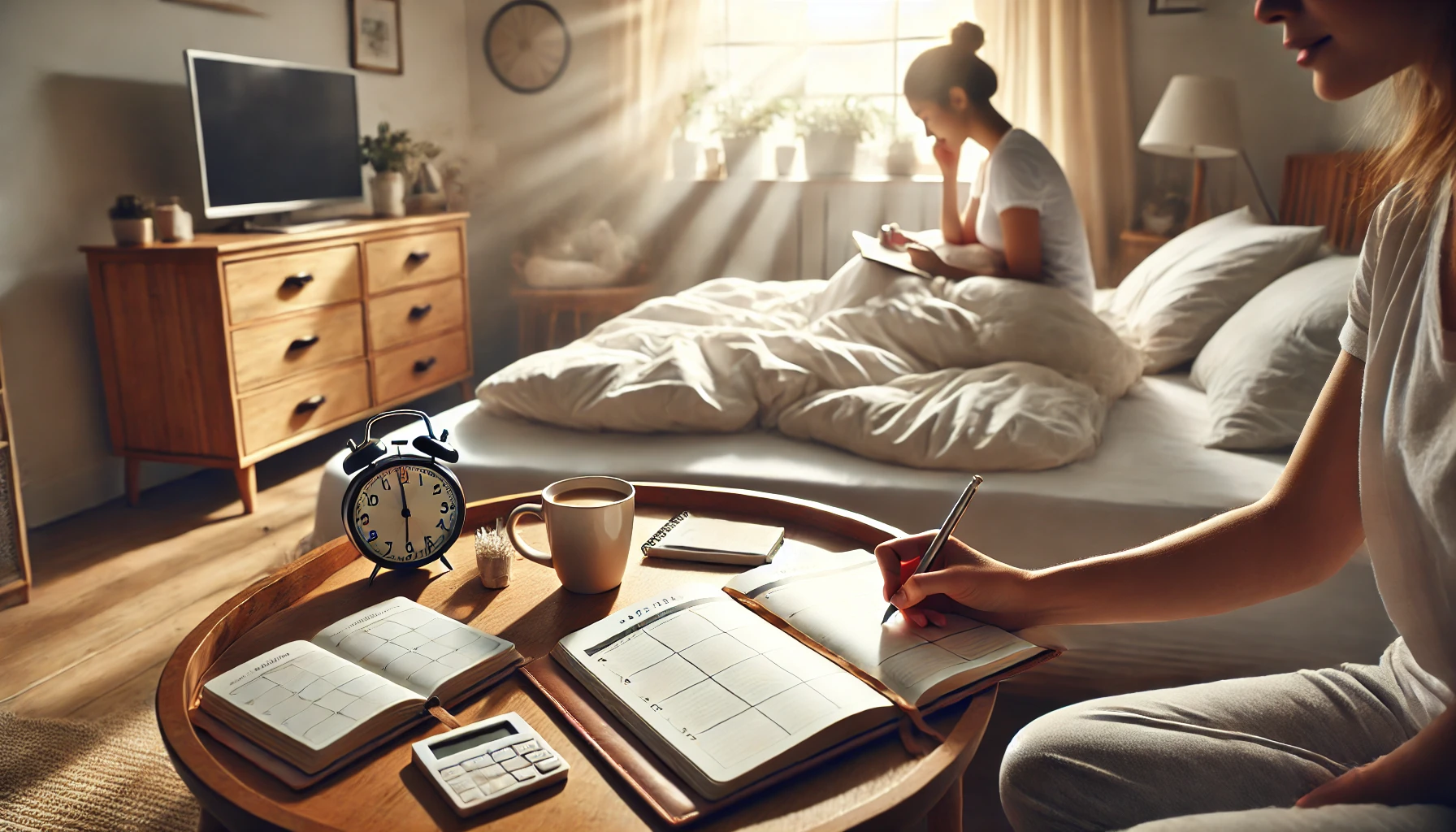Your morning doesn’t start when you open your eyes—it starts the night before. How you end your day directly affects how you feel the next morning. If your evenings are disorganized, rushed, or stressful, you’re more likely to wake up feeling tired, overwhelmed, and unmotivated.
But when you plan and organize your evening intentionally, you set yourself up for a smoother, stress-free morning, leading to more energy, focus, and productivity.
In this article, you’ll learn how evening organization improves your wake-up experience and practical steps to optimize your night for better mornings.
Why Evening Organization Impacts Your Mornings
A well-structured evening routine helps you:
✅ Wake up feeling refreshed – Quality sleep improves mood and energy.
✅ Reduce morning stress – Preparing the night before eliminates rushing and decision fatigue.
✅ Improve focus and productivity – Starting the day with clarity helps you work efficiently.
✅ Create consistency – A structured evening builds habits that lead to long-term success.
When your evening is chaotic or unplanned, it can lead to:
❌ Poor sleep quality – Making it harder to wake up energized.
❌ Morning procrastination – Feeling unmotivated to start the day.
❌ Last-minute stress – Scrambling to get things done in the morning.
By taking a few simple steps before bed, you can transform the way you wake up and start the day on a positive note.
How to Organize Your Evening for a Better Morning
1. Set a Fixed Sleep Schedule
A consistent sleep schedule trains your body’s internal clock, making it easier to wake up naturally and feel rested.
✅ How to Apply It:
- Set a fixed bedtime and wake-up time (even on weekends).
- Aim for 7–9 hours of quality sleep.
- Start winding down at least 30–60 minutes before bed to signal your body it’s time to rest.
📌 Example: If you need to wake up at 6:30 AM, set a bedtime of 10:30 PM to get 8 hours of sleep.
2. Prepare Your Clothes and Essentials the Night Before
Mornings feel rushed when you’re searching for outfits, keys, or important documents. Setting everything up in advance saves time and reduces stress.
✅ How to Apply It:
- Choose your clothes for the next day and lay them out.
- Pack your work bag, gym bag, or lunch before bed.
- Place keys, wallet, and important items in a designated spot.
📌 Example: Instead of spending 10 minutes deciding what to wear in the morning, lay out your outfit before bed and save that time for something more meaningful.
3. Plan Your Top Priorities for the Next Day
A clear plan for the next day eliminates morning decision fatigue and sets your focus immediately.
✅ How to Apply It:
- Write down your top 3 priorities for the next day.
- Review your schedule and set realistic expectations.
- Identify any meetings, deadlines, or important commitments.
📌 Example: Instead of waking up and wondering “What should I work on first?”, have your top priorities written down so you can start with purpose.
4. Reduce Screen Time and Blue Light Exposure
Using your phone or laptop late at night disrupts melatonin production, making it harder to fall asleep and wake up feeling refreshed.
✅ How to Apply It:
- Avoid screens at least 30–60 minutes before bed.
- Use night mode or blue light filters if you must use devices.
- Replace screen time with reading, journaling, or meditation.
📌 Example: Instead of scrolling social media in bed, read a few pages of a book to help your brain relax naturally.
5. Create a Relaxing Wind-Down Routine
A structured wind-down routine signals your body that it’s time to sleep, leading to deeper, more restorative rest.
✅ How to Apply It:
- Take a warm shower to relax muscles.
- Practice deep breathing or meditation to calm your mind.
- Listen to soothing music, white noise, or nature sounds.
📌 Example: If you struggle with racing thoughts before bed, try a 5-minute deep breathing exercise to release tension and prepare for sleep.
6. Keep Your Bedroom Cool, Dark, and Quiet
Your sleep environment directly impacts sleep quality, which affects how easily you wake up in the morning.
✅ How to Apply It:
- Set the room temperature to 16–20°C (60–68°F) for optimal sleep.
- Use blackout curtains or an eye mask to block out light.
- Reduce noise with earplugs or a white noise machine.
📌 Example: If streetlights keep you awake, invest in blackout curtains to create a darker, more sleep-friendly environment.
7. Journal or Reflect to Clear Your Mind
Writing down your thoughts before bed reduces mental clutter and helps you sleep peacefully, making it easier to wake up refreshed.
✅ How to Apply It:
- Write down one thing that went well today to end on a positive note.
- Reflect on any worries or tasks so they don’t keep you up at night.
- Keep a journal by your bed to capture thoughts and ideas.
📌 Example: If you tend to overthink at night, try writing a quick “brain dump” to release any thoughts before sleeping.
8. Avoid Caffeine, Heavy Meals, and Alcohol Late at Night
Eating heavy meals or drinking caffeine before bed can disturb sleep, making it harder to wake up feeling rested.
✅ How to Apply It:
- Stop drinking caffeine at least 6 hours before bedtime.
- Avoid heavy or spicy meals 2–3 hours before sleep.
- If drinking alcohol, limit intake and hydrate properly.
📌 Example: Instead of having coffee at 8 PM, switch to herbal tea or warm milk to help your body wind down.
How to Make Evening Organization a Habit
✅ Start Small – Introduce one habit at a time and build from there.
✅ Be Consistent – Stick to your routine, even on weekends.
✅ Use Reminders – Set alarms or use habit-tracking apps.
✅ Adjust as Needed – Find what works best for your lifestyle.
Final Thought: A Well-Organized Evening Leads to a Powerful Morning
By taking control of your evenings, you can:
✅ Wake up feeling refreshed and ready to go
✅ Eliminate morning stress and decision fatigue
✅ Start each day with clarity and focus
Start tonight: Pick one habit from this list and add it to your evening routine for a better wake-up tomorrow! 🚀












Leave a Reply